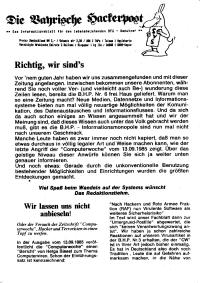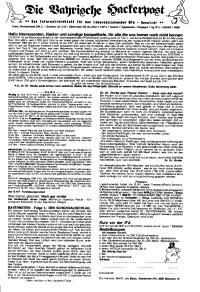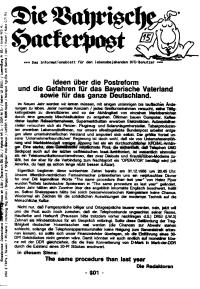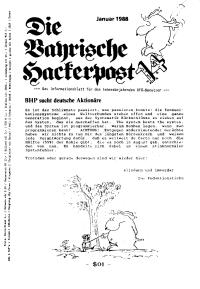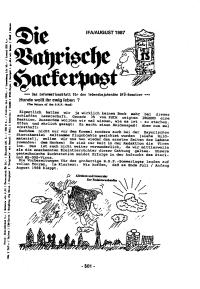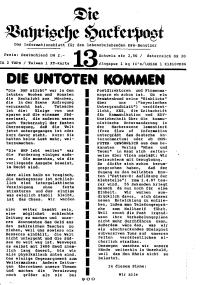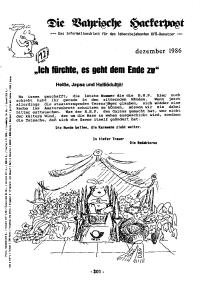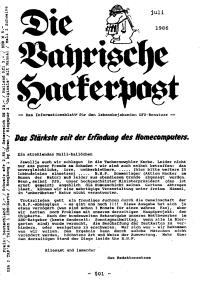Copy Link
Add to Bookmark
Report
IRList Digest Volume 3 Number 11

IRList Digest Friday, 24 April 1987 Volume 3 : Issue 11
Today's Topics:
Query - CDROM conference info, discussion group
- Free Text Database Programs
Reply - Use of Soundex-like scheme in CATALOG
Address - New Member
Announcement - Free text Browsing on Macintosh
- New offerings at Oxford Text Archive
- IJCAI travel grants
COGSCI - Visual Information Processing
Report - Government control of electronic databases
News addresses are ARPANET: fox@vtopus.cs.vt.edu BITNET: foxea@vtvax3.bitnet
CSNET: fox@vt UUCPNET: seismo!vtisr1!irlistrq
----------------------------------------------------------------------
Date: Sun, 29 Mar 87 10:23:45 O
From: Henry Nussbacher <HANK@BARILVM>
Subject: CDROM
Can you send me more info in the Microsoft CDROM stuff? Is there a newsgroup
that discusses CDROM someplace? Is there any sort of online announcement
about the CDROM stuff?
Thanks,
Hank
[Note: I don't know of any publications that will emerge about the
conference - there were various news articles, and there were booklets
from the Developers and Applications workshops for attendees.
Microsoft Press did have the new book out, "CD ROM Volume II: Optical
Publishing" which is quite good. I believe Harper and Row will handle
it and that B. Dalton will carry it.
I would welcome discussion of CD ROM under IRList - I don't think
the volume will be too great and believe that much of the discussion
would be of interest to IRList readers. - Ed]
------------------------------
Date: 13 Apr 87 09:43 EDT
From: David A. Potter / McDonnell Douglas <DAP.MDC@OFFICE-1.ARPA>
Subject: Free-Text Database Programs
[Forwarded from INFO-MAC Digest Tuesday, 14 Apr 1987 Volume 5 : Issue 78 - Ed]
In a recent issue of Info-Mac, Mark Zimmerman described Tiny Browser, a
[Note: see msg from Zimmerman below - Ed]
free-text database program he's worked up to the alpha-test phase. I'm
interested in this program -- but am also wondering what similar programs might
exist for other environments -- specifically, MS-DOS and the DEC-20 world
(Tenex/TOPS-20).
Any information would be greatly appreciated. If I get enough information back
I'll be glad to summarize for the net(s).
------------------------------
Date: Sun, 5 Apr 87 22:36:55 EDT
From: seismo!allegra!hoqam!wbf
Subject: Catalog and Soundex, etc.
Ed,
. . .
I saw the request in IRLIST about use of soundex type
algorithms in IR. We put one of those in CATALOG and people seemed
to like it alot. I wasn't sure what kind of info Alan Smeaton
was interested in, but if you think he'd be interested, please pass
this along.
[Note: this refers back to V3 #5 query - Ed]
. . .
Bill Frakes
------------------------------
Date: 7 April 1987, 11:45:45 SET
From: USWFF001 at DBIUNI11
Subject: addition
I am interested in getting added to the IRList mailing list.
Matthias Winterhager
Science Studies Unit
University of Bielefeld
P.O.B. 8640
D-4800 Bielefeld 1
Federal Republic of Germany
------------------------------
Date: 30 Mar 87 06:53 EST
From: science@nems.arpa (Mark Zimmermann)
Subject: free-text browsing on Mac, etc.
Tnx for latest IRList! Is there an archive somewhere that I could access
via anonymous ftp login on arpanet, and could you give me the address? Or
alternatively, if it's not too much trouble could you forward to me the past
year or two worth of IRList?
[Note: We should be on the NSFNET "soon" in which case I will announce
FTP instructions. Who on ARPANET is keeping a collection online these
days? - Ed]
I want some large volumes of text to index/browse ... I'm developing a very
simple indexer/browser system on the Apple Macintosh. If anybody is interested
in getting a copy of source code (MacForth is the language) as well as
stand-alone application and sample index files, please send me a self-addressed
stamped envelope and a 3.5" Macintosh disk. The program ("Tiny Browser")
requires at least 512K and works on a Mac, Mac+, or Mac SE. (Not yet on a
Mac II ... tnx, btw, for the comments on it.)
Basic concept of my program is to create a complete inverted index to every
word in the "database" (a huge text file). The user then has windows in which
to scroll around in the index, click with mouse on interesting words, call
up key-word-in-context scrollable window, and call up a full-text window
showing the region of the database around a selected item. Very fast, easy,
requires no reformatting of data, etc. Highlight selections in retrieved
text with mouse and copy/paste them out into other files as desired.
I could go on and on ... for further data, contact me at:
Mark Zimmermann science@nems.arpa
9511 Gwyndale Drive (301)565-2166
Silver Spring, MD 20910 75066,2044 on CompuServe
I am in need of alpha-test users who will stress the program and make
suggestions for improvements. Tnx - ^Z
[Note: It would be nice to see this and to extend it with more
weighting schemes etc. Who else has a Mac IR system? - Ed]
------------------------------
Date: 2-APR-1987 15:48:01
From: ARCHIVE%UK.AC.OXFORD.VAX3@AC.UK
Subject: . . . OTA
. . .
On another matter, would you like to insert an annoucement in IRList about
the availability of our new catalogue? The Text Archive shortlist is available
in mmachine-readable form and is updated regularly; copies can be sent
to any BITNET or EDU network address, on receipt of an enquiry addressed
to us at archive@uk.ac.ox.vax3
Amongst recently acuqired texts of interest to IRList subscribers might be
the MRC Psycholoinguistic database, created by Mike Wilson at RL.EARN; this
combines the wordlist extracted from the Shorter Oxford by Dolby et al with
a variety of "psycholinguistic norms" to provide a variety of senmantic and
other information. Also, we now have Rick Kazman's reqorking of OALDCE in
fully parsed (SGML style) format. And we just received the bible (both King
James and Revised Standard versions) too!
Lou Burnard
------------------------------
Date: Thu, 16 Apr 87 21:20:49 est
From: walker@flash.bellcore.com
Subject: Travel Grant support for IJCAI-87
TRAVEL GRANTS FOR IJCAI-87
IJCAII has submitted a proposal to NSF to provide travel allowances
for U.S. participants attending IJCAI-87 in Milan. It also plans to
provide an equal amount of IJCAII funds to support participants from
other countries. The amounts awarded would probably cover no more than
discount air fares and would vary depending on location and on the
number of persons applying. The intent is to help about 100 people.
Priority will be given to younger members of the AI community who
are presenting papers or are on panels and who would not otherwise be
able to attend because of lack of travel funds. Note that U.S.
applicants must use U.S. air carriers.
Applications should be submitted as soon as possible, even though we
have not received confirmation from NSF about a grant award. The
application should briefly describe benefits expected from attendance;
identify expected form of conference participation (e.g., presenting
paper); state current sources of research funding; and list travel
support from other sources. A brief resume should be attached, and
students should include a letter of recommendation from a faculty
member.
Five copies of the application should be sent, no later than 1 June
1987, to:
Priscilla Rasmussen
IJCAI-87 Travel Grants
Laboratory for Computer Science Research
Hill Center, Busch Campus
Rutgers, the State University
New Brunswick, NJ 08903, USA
------------------------------
Date: Tue, 31 Mar 87 02:45:19 est
From: DEJONG%OZ.AI.MIT.EDU@mc.lcs.mit.edu
Subject: Cognitive Science Calendar [Extract - Ed]
Date: Monday, 30 March 1987 9:08-EST
From: Liz A. Highleyman <LIZ%OZ.AI.MIT.EDU at XX.LCS.MIT.EDU>
Re: Vision Seminar
- - - -
Monday, 30 March 4:00pm Room: NE43-8th floor playroom
9.382: SEMINAR ON VISUAL INFORMATION PROCESSING
Hierarchical Object Recognition Using Libraries
of Parameterized Model Sub-parts
Gil Ettinger
MIT AI Laboratory
A model-based vision system which exploits both object scale and
structure hierarchies is developed to achieve a robust recognition
system and to study organization and indexing schemes of model
libraries. The goal of the system is to recognize parameterized
instances of model objects contained in a large knowledge base despite
the presence of noise and occlusion. In order to achieve the goal of
robustness, the viewed objects in the scene may be scaled or
mirror-image instances of the known models, and component sub-parts may
be scaled, rotated, or translated relative to each other. The research
approach is to develop an object shape representation which incorporates
a component sub-part hierarchy to allow for efficient and correct
indexing into an automatically-generated part library as well as for
relative parameterization among sub-parts, and a scale hierarchy to
allow for a general to specific recognition procedure. After analysis
of the inherent tradeoffs in the recognition process, a system based on
a curvature primal sketch representation and a constrained search
recognition engine is implemented. Examples of the system's performance
are given, followed by an analysis of the results.
------------------------------
Date: Mon, 23 Mar 87 02:31:08 est
From: DAUL@office-1.arpa
Subject: 'sensitive' information
relief." Some of my our freedom has returned! --Bi//
[Following is a message forwarded by Daul - Ed]
Originally-Sent-To: Physics@sri-unix.ARPA
Originally-From:
pur-ee!j.cc.purdue.edu!h.cc.purdue.edu!pur-phy!piner@UCB-Vax.arpa
From: RPARK
To: WHATSNEW
THE THREAT OF GOVERNMENT CONTROLS ON ELECTRONIC DATABASES
that contain "sensitive but unclassified information" has receded, at least
temporarily (WN 27 Feb 87). In a stunning reversal of policy, Frank Carlucci,
the new National Security Advisor to the President, announced in a conciliatory
letter to Rep. Jack Brooks (D-TX), Chairman of the Government Operations
Committee, that NTISSP-2, the notorious "Poindexter Memorandum," was being
rescinded. It was this directive that defined "sensitive but unclassified
information" as information affecting "national security or other Federal
Government interests," a definition that could fit a giraffe. Carlucci also
said that NSDD 145, National Policy on Telecommunications and Automated
Information Systems Security, which in Brook's words created a "shadow
government," was being reviewed. The reversal is attributable to the solid
opposition of groups such as the library associations and scientific societies.
Although Carlucci declined to testify on grounds of executive
privilege, he refused to extend that protection to Poindexter. showed up before
the Committee on Tuesday, but confined himself to puffing on his pipe taking
the Fifth. Secretary of Commerce Baldrige and Deputy Secretary of Defense Taft
testified that responsibility for computer security should be moved to a
civilian agency.
Perhaps the most significant testimony on Tuesday came at the end,
after most of the press had left to file their stories. Harold Relyea of the
Library of Congress discussed the whole phenomenon of National Security
Decision Directives (NSDD's). Out of some 200 NSDD's, all but five are secret,
and are not generally available even to Congress. They have apparently been
used to authorize such things as the disinformation campaign against Libya and
$50M for Argentina to train Contras. He said they bring us very close to the
most dangerous practice of totalitarian government -- rule by secret law.
------------------------------
END OF IRList Digest
********************











